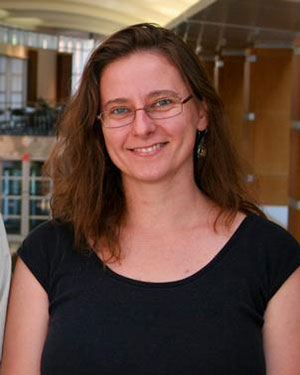
What influenced your decision (personal and professional) to become a scientist in this field?
There are a variety of influences that got me to this profession – some very deliberate, others completely serendipitous. I always loved science – especially biology and chemistry. There are a handful of really important teachers and mentors that encouraged me to pursue science and certainly my parents (who are both engineers) guided me in that direction. There are also a large number of friends who made the journey fun and helped me on the path. When I couldn't decide between physical chemistry and neuroscience during graduate school applications, seeing the few women at the chemistry interviews steered me to neuroscience. I also wasn't sure that graduate school was really for me, but being an international student made me stick with a PhD and a postdoc because I didn't want to lose my visa and have to leave the US. It turned out well and I love being a neuroscientist in an academic setting.
What are your greatest achievements thus far?
When I was in graduate school I was constantly told that there were not enough jobs in academia and I would never make it to a faculty position. I am now a tenured full professor. So I guess that still feels like my greatest achievement.
What do you hope to accomplish in the next 10 years?
I don't think I have a set goal in mind. I don't have leadership aspirations so I hope to be in the lab doing what I am doing now. I feel like science always takes us in unexpected directions so I hope to be surprised by what we have accomplished.
What were the biggest professional obstacles you had to overcome? Did you ever have the impression that it would be easier/harder if you were male?
I grew up surrounded by educated, working women so I always expected that I would have a career. I have never felt out of place as a woman in science or felt undervalued by my male colleagues. I think the biggest obstacle for me was doubting my abilities and my chances of success. This may be more of a female trait – so in that way maybe it would have been easier if I were a man!
Do you serve on any committees/hold leadership positions within and outside the University of Rochester (UR)? What is your impression of being a female leader in this environment?
I direct our graduate program and have served on a number of committees both within and outside the university. I have never felt that my being female has altered my experience in that context. However, we do have very few women in leadership positions and I think that would change if there were clear procedures for how appointments to these sort of positions were handled.
What strategies do you use to manage both a career and private life?
It has helped me to make priorities and not worry too much if the things that are low on the list don't go as well as I hoped. Having a family has given my life balance and put things in perspective. I am a much better scientist as a result. I don't sweat the small stuff.
In your opinion, what changes are needed in your field, in academia, and in science in general to be more attractive to women+ in neuroscience and possible future scientists?
It would be great to make it easier for scientists to take breaks from their careers and re-enter academia. Currently it is not possible to take a hiatus from a bustling lab and pause grant funding so you can stay home with young children or take care of ailing parents. Changing this would require concerted efforts on the parts of granting agencies, universities and scientists themselves. And allowing easier paths for re-entering academia would benefit women and families in general regardless of whether men or women were taking advantage of them.
What advice would you give to your younger self and to future scientists?
Don't be too hard on yourself and don't compare yourself to others – you have no idea how you look to others or how others see themselves.